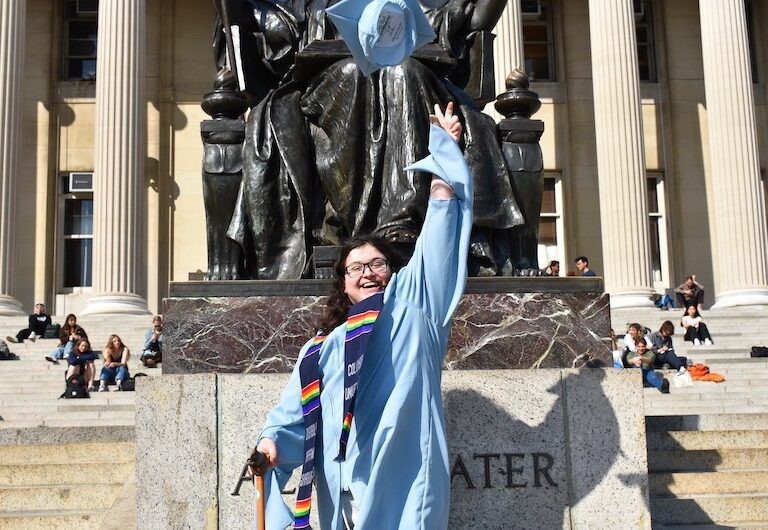Over a latte and water at Joe Coffee adjacent to Pulitzer Hall, home to Columbia Journalism School, Leslie A. Zukor (JRN’23) says upfront, “I’m an autistic person with visual disabilities.”
For Zukor, acknowledging identity is a step toward acceptance, and she’s made it her mission at Columbia to, as she says, “include disability as part of wider diversity initiatives.” Thanks to Zukor’s efforts in coordination with the Columbia Student Disability Network, Columbia will hold its first Disability Affinity Graduation celebration this Saturday, April 22.
A Path to Journalism School
Born in Portland, Oregon, and raised outside of Seattle, Washington, Zukor started her college career at Wellesley in 2003 and finished it just under a decade later at Reed College, where she majored in anthropology. Ten years after graduating from Reed, she applied and was accepted to Columbia Journalism School (CJS), where she started her part-time program in 2021.
Her studies in anthropology prepared her well for a degree in journalism. “Sometimes people look down on other groups of people,” said Zukor. “My cultural anthropology training taught me to not judge, and that helps me do journalism work.”
Unexpected Activism
Zukor did not intend to be an activist at Columbia. She simply planned to devote her time to her classes and eventually to become a journalist. However, when she received a list of affinity groups before arriving at Columbia Journalism School, she found that there was no disability group. She thought, “Well, I better start one.”
The group she created, the Columbia Journalism School Alliance of Journalists with Disabilities, is believed to be the first disability affinity group formed at a journalism school in the U.S. “The Alliance of Journalists with Disabilities is a vital step towards inclusion for people with disabilities at Columbia Journalism School,” said Jelani Cobb, dean of Columbia Journalism School. “We applaud Leslie’s contributions and her efforts to move us in the right direction.”
Recognizing the benefits of this group at CJS, Zukor set out to reach students across the University, so she co-founded the Columbia Student Disability Network (CSDN). People with disabilities, including Zukor, often have multiple challenges, not only with their conditions, but with structural barriers, such as ableism and getting sufficient accommodations in an academic environment.
The Alliance of Journalists with Disabilities is a supportive space where students can find others in similar situations and discuss the difficulties of getting accommodations and managing various illnesses and doctor’s appointments while taking on a full school work load, whereas the Columbia Student Disability Network primarily hosts events in conjunction with other student groups.
A Long History of Affinity Group Graduation Ceremonies
Multicultural and affinity graduation celebrations have had a long history at Columbia University. They began more than 20 years ago as a way to allow students to celebrate the cultural intersections in their lives and honor the communities to which they belong. This year, Columbia anticipates that about 1,100 undergraduate and graduate students will partake in these smaller celebrations before the University commencement on May 17.
Each ceremony reflects the distinctive culture that they are celebrating. For instance, native Hawaiian students have traditional leis sent in for the celebrations. Students who participate in the Lavender celebrations attach rainbow tassels to their mortar boards. Attendees at Black graduation ceremonies are treated to step performances from Black Greek organizations. And perhaps most significantly, the families that helped the students on their journey are incorporated into most of the ceremonies.
“These more intimate celebrations are complements to the larger ceremonies,” said Melinda Aquino, associate dean of multicultural affairs. “Oftentimes, identity communities have helped students feel grounded throughout their experience at Columbia. An identity celebration is a moment of not just honoring the students, but also honoring all the people who’ve gotten them there.”
Recognizing Disability as a Benefit, Not a Limitation
After learning about Columbia’s many multicultural and affinity group graduation celebrations, Zukor decided that she needed to organize one for students with disabilities. First, she needed to find funding. University Life awards Social Justice Mini-Grants to students who have innovative ideas to address social justice. Zukor applied and won a grant, which helped finance the event. After the financing went through, Zukor and the Columbia Student Disability Network executive board got to work on the planning. “I could not have put the Disability Affinity Graduation celebration together without such a supportive e-board,” Zukor said. “CSDN Treasurer Xiang Ji has gone out of her way to make the event come together seemlessly.”
More than 110 students from 16 schools will participate in this year’s University-wide Disability Affinity Graduation celebration. Disability-affirming stoles will be given out to graduates, and individuals who have made outstanding contributions to the disability community at Columbia will be recognized with awards. Zukor will be a recipient of a Disability Community Connection Champion award. Dr. Heather Swadley, who is autistic and an attorney and professor of political science at Swarthmore College, is the keynote speaker.
Zukor hopes that the Disability Affinity Graduation celebration will become an annual event and will help change people’s perceptions of persons with disabilities. “Often, people see disabilities as limiting,” said Zukor. “The goal of the celebration is to recognize people with disabilities for their actual achievements. It’s about celebrating disabled people for who we are.”
Source link

